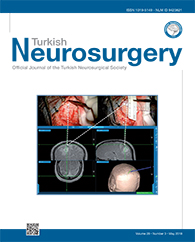2University of Health Sciences, Gulhane Education and Research Hospital, Department of Otorhinolaryngology, Ankara, Turkey DOI : 10.5137/1019-5149.JTN.19510-16.0 AIM: To investigate whether sleep quality and sleepiness of patients who undergo surgery for pituitary adenomas differ from healthy individuals.
MATERIAL and METHODS: Forty-four patients who were operated for pituitary adenomas and 44 healthy individuals, 88 subjects in total, were evaluated by a questionnaire. All questionnaires and scales were applied by the same researcher without the name of the participant in order to maintain consistency. Statistical analyses were conducted with the SPSS for Windows 23.00 package program.
RESULTS: Of the 88 participants, 44 (50%) were patients who were operated for pituitary adenomas, while 44 (50%) were control subjects. 38 (43.2%) of the participants were male, 50 (56.8%) were female. The average age of the participants was 37 ± 12.24 years. The best sleep quality was found in 41-50 years group (7 patients). In the control group, 23 patients (52.3%) had a sleep quality index above 5 and 21 patients (47.7%) had a value below 5. In the control group, 8 patients (21.2%) between 21-30 years were found to have poor sleep quality by age.
CONCLUSION: Sleepiness and sleep quality have physiological, social and psychological effects on individuals. There is no statistically significant difference in sleep quality and sleepiness scales between patients operated for pituitary adenomas and healthy individuals. However, it is recommended that polysomnography should be used to examine these patients in more detail.
Keywords : Sleep, Pituitary Adenoma, Polysomnography




